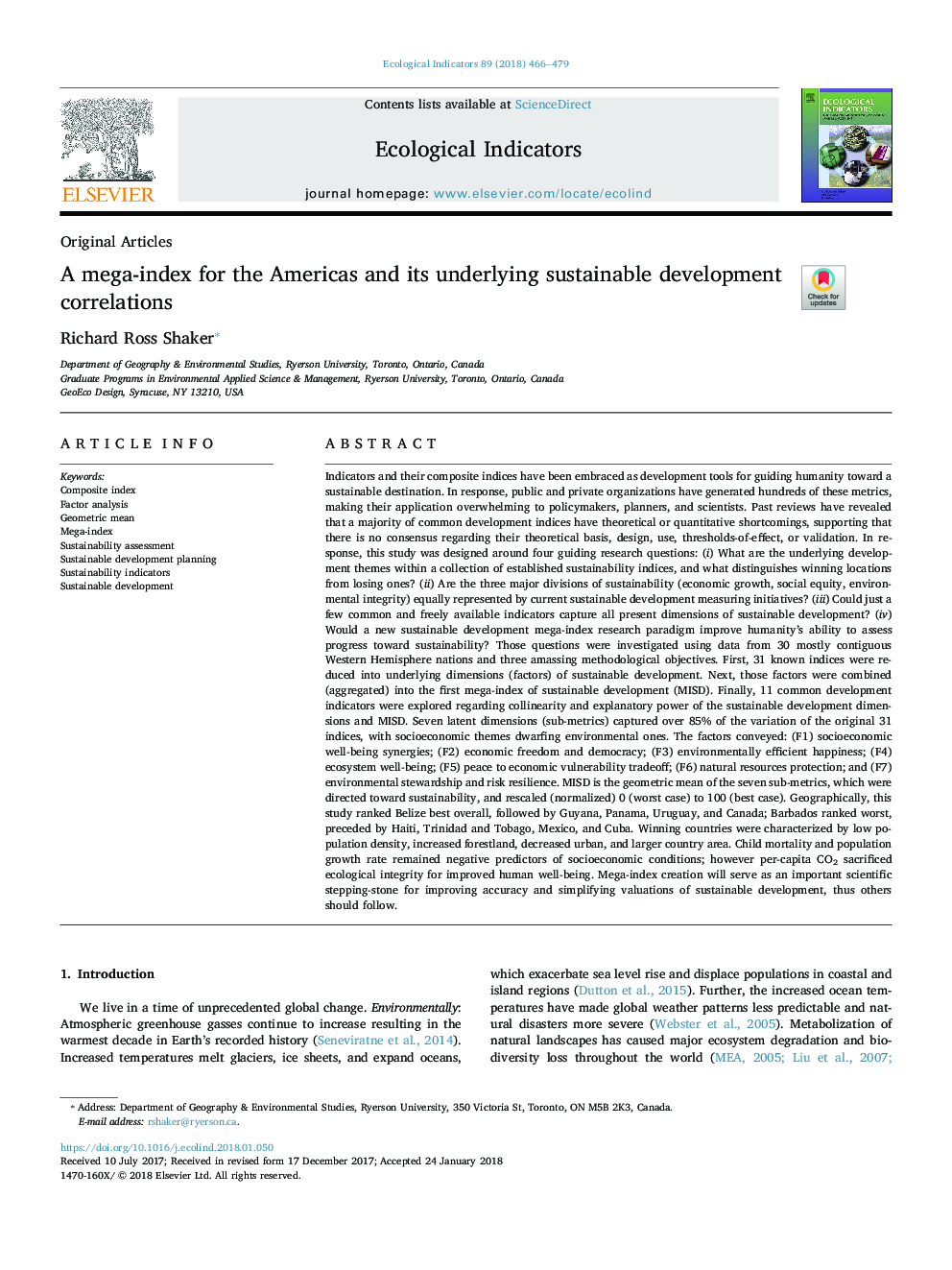| کد مقاله | کد نشریه | سال انتشار | مقاله انگلیسی | نسخه تمام متن |
|---|---|---|---|---|
| 8845491 | 1617113 | 2018 | 14 صفحه PDF | دانلود رایگان |
عنوان انگلیسی مقاله ISI
A mega-index for the Americas and its underlying sustainable development correlations
ترجمه فارسی عنوان
شاخص مگا برای آمریکا و همبستگی توسعه پایدار آن
دانلود مقاله + سفارش ترجمه
دانلود مقاله ISI انگلیسی
رایگان برای ایرانیان
کلمات کلیدی
شاخص کامپوزیت تجزیه و تحلیل فاکتور، میانگین هندسی، مگا-شاخص، ارزیابی پایداری، برنامه ریزی توسعه پایدار، شاخص های پایداری، توسعه پایدار،
موضوعات مرتبط
علوم زیستی و بیوفناوری
علوم کشاورزی و بیولوژیک
بوم شناسی، تکامل، رفتار و سامانه شناسی
چکیده انگلیسی
Indicators and their composite indices have been embraced as development tools for guiding humanity toward a sustainable destination. In response, public and private organizations have generated hundreds of these metrics, making their application overwhelming to policymakers, planners, and scientists. Past reviews have revealed that a majority of common development indices have theoretical or quantitative shortcomings, supporting that there is no consensus regarding their theoretical basis, design, use, thresholds-of-effect, or validation. In response, this study was designed around four guiding research questions: (i) What are the underlying development themes within a collection of established sustainability indices, and what distinguishes winning locations from losing ones? (ii) Are the three major divisions of sustainability (economic growth, social equity, environmental integrity) equally represented by current sustainable development measuring initiatives? (iii) Could just a few common and freely available indicators capture all present dimensions of sustainable development? (iv) Would a new sustainable development mega-index research paradigm improve humanity's ability to assess progress toward sustainability? Those questions were investigated using data from 30 mostly contiguous Western Hemisphere nations and three amassing methodological objectives. First, 31 known indices were reduced into underlying dimensions (factors) of sustainable development. Next, those factors were combined (aggregated) into the first mega-index of sustainable development (MISD). Finally, 11 common development indicators were explored regarding collinearity and explanatory power of the sustainable development dimensions and MISD. Seven latent dimensions (sub-metrics) captured over 85% of the variation of the original 31 indices, with socioeconomic themes dwarfing environmental ones. The factors conveyed: (F1) socioeconomic well-being synergies; (F2) economic freedom and democracy; (F3) environmentally efficient happiness; (F4) ecosystem well-being; (F5) peace to economic vulnerability tradeoff; (F6) natural resources protection; and (F7) environmental stewardship and risk resilience. MISD is the geometric mean of the seven sub-metrics, which were directed toward sustainability, and rescaled (normalized) 0 (worst case) to 100 (best case). Geographically, this study ranked Belize best overall, followed by Guyana, Panama, Uruguay, and Canada; Barbados ranked worst, preceded by Haiti, Trinidad and Tobago, Mexico, and Cuba. Winning countries were characterized by low population density, increased forestland, decreased urban, and larger country area. Child mortality and population growth rate remained negative predictors of socioeconomic conditions; however per-capita CO2 sacrificed ecological integrity for improved human well-being. Mega-index creation will serve as an important scientific stepping-stone for improving accuracy and simplifying valuations of sustainable development, thus others should follow.
ناشر
Database: Elsevier - ScienceDirect (ساینس دایرکت)
Journal: Ecological Indicators - Volume 89, June 2018, Pages 466-479
Journal: Ecological Indicators - Volume 89, June 2018, Pages 466-479
نویسندگان
Richard Ross Shaker,
